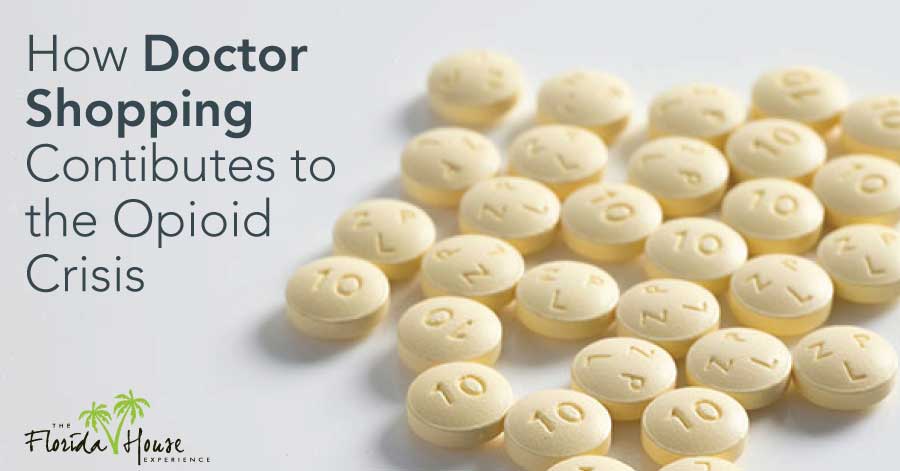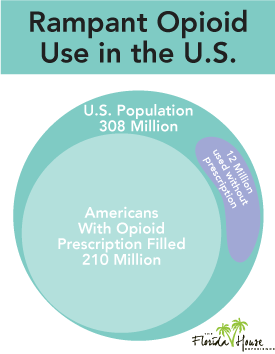
While fentanyl is synthetic, heroin illegal, and pain relievers available with a prescription; all three have one thing in common. They make up a highly addictive class of drugs known as opioids. Opioids have very similar chemical structures and interact with the opioid receptors in the body and brain to produce a sense of euphoria. Due to their pain-relieving qualities and relatively safe nature if used over a short period of time, opioid abuse has become a major consequence of doctor shopping. With the ease of which consumers can get prescriptions from doctors, there has been a rise in overdose, addiction, and death due to frequent misuse.
What are Opioids?
An opioid is a naturally derived medication taken from the sap that is produced by the poppy seed plant. Opiates are any drug taken from the very same plant. The difference lies in the fact that while opiates are entirely natural, opioids are a much broader term that includes both man made and synthetic drug forms. Therefore, while all opiates are opioids not all opioids are opiates.
Regardless of the whether they are synthetic or not, Florida House maintains that opioids are incredibly addictive and far too accessible. They were initially made to mimic the effects of morphine, dangerously combining euphoria with a sense of painlessness. Some doctors even recommend it for diarrhea or combine it with drugs like aspirin without informing the patient. Not only are opioids overprescribed, they are widely used in the treatment and management of many forms of pain. Some of the most recognizable forms of opiates used across America are:
- Codeine
- Morphine
- Methadone
- Buprenorphine
- Heroin
- Opium
- Hydrocodone
- Oxycodone
- Fentanyl
Opioids bind to protein molecules in the membranes of some nerve cells which are found primarily in the central nervous system and gastrointestinal tract. They send signals to the brain, creating an “opioid effect” that results in slowed breathing, pain blocking, calmness, and anti-depressing effects. They are used because the body often is not capable of generating enough opioids naturally to deal with chronic or severe pain. There are four broad classes of such opioids:
- Opium alkaloids (morphine and codeine)
- Fully synthetic opioids (methadone) with structures different from opium alkaloids
- Endogenous opioids that are a natural product of the body (endorphins)
- Semi-synthetic opioids (Buprenorphine, heroin, and oxycodone)
Opioid Abuse in the United States
We at Florida House believe that it is important not to judge and ridicule those who suffer with opioid abuse. It is important to understand the appeal of opioids. Opioids, in low to moderate amounts, does not impair or intoxicate an individual the way alcohol does. It is not as potent as hallucinogens or marijuana and yet is able to produce immense feelings of contentment and peace that many cannot get from their own lives. At higher doses, however, the physical effects of opioids can be deadly. Breath can be slowed to the point of death and is a major contributor to overdose. Due to the relatively little high that small amounts of opioids provide, users feel that they can combine it with other drugs, such as Xanax, that are potentially lethal. Thus, there is a very fine line between euphoria and fatality with dealing with opioids and opioid abuse.
This delicate nature of the drug is why opioid abuse in the United States continues to grow every year. Doctors are regularly prescribing them to unknowing patients. The ease at which opioids can be obtained, especially in opiate form, now poses a threat to elderly people and children. In 2010, over 210 million Americans had a prescription for opiates filled. That same year, a report showed that some 12 million used opiates without a prescription. Those numbers are enough to give every citizen a daily pill for an entire month. It does not help that opioids are cheap and so addictive that users may begin to demonstrate a pattern of opioid abuse within days of first usage.
The fact that the majority of opioid addicts got started after a prescription from a doctor should be enough to eliminate the negative stigma surrounding opiate abuse. Sadly, most people still see it as the individual’s fault that they got addicted, and label them an “addict” or “junkie”. With this public perception, most people suffering from opioid addiction, even though they got started from a doctor’s recommendation, refuse to seek heal or talk to anyone about their problem. We need to change the perception of opioid abuse in order to start saving lives.
Doctor Shopping and Opioid Abuse
 The epidemic of opioid abuse would not be complete without doctor shopping. Doctor shopping is defined as seeing multiple treatment doctors, either during a single illness episode or to get prescription medications illegally. For years now, this activity has been permitted to continue because healthcare professionals are freely prescribing painkillers to their patients without any care for how opioid abuse could develop as a result. There has been mounting evidence to prove to potency and addictive nature of opioids and yet they killed more than 28,000 people in 2014. Meanwhile, the sales of OxyContin, Percocet, Vicodin, and Percodan have skyrocketed.
The epidemic of opioid abuse would not be complete without doctor shopping. Doctor shopping is defined as seeing multiple treatment doctors, either during a single illness episode or to get prescription medications illegally. For years now, this activity has been permitted to continue because healthcare professionals are freely prescribing painkillers to their patients without any care for how opioid abuse could develop as a result. There has been mounting evidence to prove to potency and addictive nature of opioids and yet they killed more than 28,000 people in 2014. Meanwhile, the sales of OxyContin, Percocet, Vicodin, and Percodan have skyrocketed.
Desperate patients know to go and see different providers because doctors have failed to the take the initiative and look into the history of those seeking their services. Addicts will completely fabricate symptoms or leave out information on forms and during interviews or meetings. Some have been found to lie about allergies or purposefully hurt themselves to get stronger opioids or falsely damaged previous prescriptions to get another dose of drugs from their provider. According to a 2011 Government Accountability Office report, around 170,000 Medicare patients were believed to have engaged in doctor shopping in 2008. These numbers are staggering considering they only cover Medicare users and because doctor shopping, regardless of local or state laws, is completely illegal and can result is jail time for somebody who is also an addict.
Doctors can use a database to check the history of their patient’s opioid use and whether they are combining drugs. These databases, called prescription monitoring programs, will show if patients are already getting painkillers from other sources and engaging in the practice of doctor shopping. However, providers do not assess whether people are at a risk of opioid abuse and so addicts can easily get a prescription from each center they visit. Thankfully new laws are being promoted that will help to curb doctor shopping and slow the growth of opioid abuse.
Several states have enacted rules to limit the quantity of opioids that can be prescribed for pain relief in addition to restricting the usage of opioids when dealing with chronic pain. These laws will help to decrease both rates of over prescription and opioid abuse as fewer people will have access to huge amounts and doctors will feel pressure when recommending them. In some areas, doctors will now be required to take courses to learn about the effects of opioids on the public.
Getting Treatment for Opiate Addiction
While the withdrawal symptoms of quitting opioids are uncomfortable, Florida House is certain that sobriety is not only entirely possible, it has been accomplished by many others before you. Treatment and support are readily available at all our locations and with proven detox programs. If you or someone you know is struggling with opioid abuse, please speak with a member of our team of highly trained and compassionate individuals at (833) 596-3502 for further help.
We provide complete a confidential opioid addiction treatment program and can meet any needs you may have. We have experience helping thousands of people with addiction from all walks of life. Regardless of you are, gender, drug of choice, financial status, or career stage, we can help you get your life back on track. Don’t let those excuses get in the way of living your happiest and most fulfilled life.







